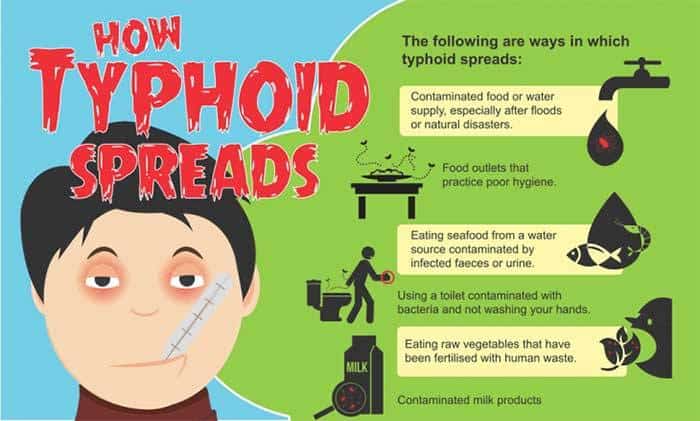Typhoid fever is an infection caused by Salmonella typhi. It is a serious health challenge in developing countries, including Nigeria. In 2010, there were 26.9 million cases with 217,000 recorded death.
HOW DOES TYPHOID FEVER SPREAD
In the setting of poor water supply, sewage disposal and sanitation, it spreads through feaco-oral route. See the image below:

In carriers (those who have the infection), the organism causing the infection are located in the gall bladder and excreted via the stool and urine.
SYMPTOMS (Your Possible Complaints)
This include: generalized body pain, unexplained fever with headache, malaise, cough with or without sputum and constipation. Later you may experience diarrhea which may be bloody.
SIGN (what your Doctor will find on when checking your body)
- Enlarged spleen
- Hepatomegaly (enlarged liver)
- Scattered crepitation in the chest
- In white skinned people, rash which is slightly raised, red-rose spot which fades on pressure are seen in the upper part of abdomen and back
- Tenderness in the right iliac fossa usually from ulcerated peyers patches.
INVESTIGATION
Your doctor may ask you to do the following investigations:
Full blood count
Blood culture: Blood culture is the most important of investigation. Stool and urine may be positive in the third and fourth week.
Liver function test: Liver transaminase and serum bilirubin are usually raised to twice the reference range.
Widal Test: It may be used to make a presumptive diagnosis of typhoid fever in a resource limited environment.
TREATMENT
When the definitive diagnosis of typhoid fever is made, your doctor will place on antibiotic at recommended dose.
PREVENTION OF TYPHOID FEVER
The surest way of protecting yourself against typhoid fever is carefully selecting what you eat and drink. Typhoid vaccine is not 100% protective hence careful selection of what you eat and drink is VERY IMPORTANT:
1. Eat food that are thoroughly cooked.
2. When you travel, always go for trusted bottle water.
3. If fruits cannot be peeled, avoid it. Wash your hands with soap before peeling the fruits yourself.
4. Avoid eating raw vegetables.
5. Avoid eating from food vendors in the street.
TO LEARN MORE, WATCH THE VIDEO BELOW:
FURTHER READING:
The American Journal of Tropical Medicine and Hygiene.
A.A.C.C Lab Test Online
Center for Disease Control and Prevention

Dr. Adeyemo Olusola is a medical graduate of Olabisi Onabanjo University, Ogun State, Nigeria along with certificate in advanced diploma in Principles of Nutrition, Management and Leadership, Dublin and Certificate in Global Health from London School of Hygiene and Tropical Medicine. In addition to his numerous certifications, he is a certified Telemedicine Physician from Harvard Medical School, USA. He is an avid reader of books from different oases of life, expert in data analysis. “So many a time, I have seen people die avoidable death because of lack of knowledge or information, falling victim of fate. There is then a necessity laid on us to help arm our society to the teeth, as a healthy society cannot be detached from an informed one. Hence, there is need for healthgist.net. We hope you will have a wonderful stay on our website.”
